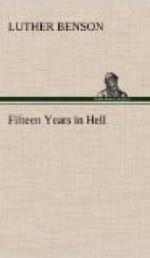At the very threshold of blooming manhood I found myself subject to all the disadvantages which mankind, if they reflected upon them, would hesitate to impose upon acknowledged guilt. In every human countenance I feared to find an enemy. I shrank from the vigilance of human eyes. I dared not open my heart to the best affections of our nature, for a drunkard is supposed to have no love. I was shut up within my own desolation—a deserted, solitary wretch in the midst of my species. I dared not look for the consolation of friendship, for a drunkard is always the subject of suspicion and distrust, and is not supposed to be possessed of those finer feelings that find men as friends. Thus, instead of identifying myself with the joys and sorrows of others, and exchanging the delicious gifts of confidential sympathy, I was compelled to shrink back and listen to the horrid words, You are a drunkard—words the very mention or thought of which has ten thousand times carried despair to my heart, and made me gasp and pant for breath. Thus it was at the very opening of life, and thus it ever has been, and thus it is to-day. I have struggled, and with streaming eyes tried to wrench the chains from my bruised and torn body. My weary and long-continued struggles led to no termination. Termination! No! The lapse of time, that cures all other things, but makes my case more desperate. For there is no rest for me. Whithersoever I remove myself, this detestable, hated, sleepless, never-tiring enemy is in my rear. What a dark, mysterious, unfeeling, unrelenting tyrant! Is it come to this? When Nero and Caligula swayed the Roman scepter, it was a fearful thing to offend the bloody rulers. The Empire had already spread itself from climate to climate, and from sea to sea. If their unhappy victim fled to the rising of the sun, where the luminary of day seems to us first to ascend




